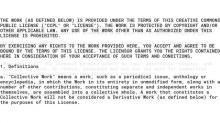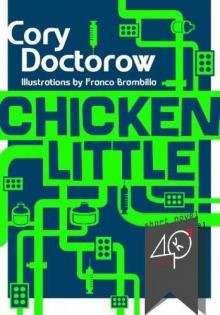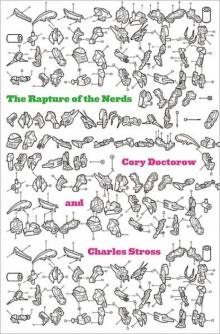- Home
- Cory Doctorow
Chicken Little Page 4
Chicken Little Read online
Page 4
They changed the subject soon after, with uneasy laughter. They ended up on a park bench near the family of dancing bears, whom they watched avidly.
"They seem so happy," he said. "That's what gets me about them. Like dancing was the secret passion of every bear, and these three are the first to figure out how to make a life of it."
She didn't say anything, but watched the three giants lumber in a graceful, unmistakably joyous kind of shuffle. The music -- constantly mutated based on the intensity of the bears, a piece of software that sought tirelessly to please them -- was jangly and pop-like, with a staccato one-two/onetwothreefourfive/one-two rhythm that let the bears do something like a drunken stagger that was as fun to watch as a box of puppies.
He felt the silence. "So happy," he said again. "That's the weird part. Not like seeing an elephant perform. You watch those old videos and they seem, you know, they seem --"
"Resigned," she said.
"Yeah. Not unhappy, but about as thrilled to be balancing on a ball as a horse might be to be hitched to a plough. But look at those bears!"
"Notice that no one else watches them for long?" she said.
He had noticed that. The benches were all empty around them.
"I think it's because they're so happy," she said. "It lays the trick bare." She showed teeth at the pun, then put them away. "What I mean is, you can see how it's possible to design a bear that experiences brain reward from rhythm, keep it well-fed, supply it with as many rockin' tunes as it can eat, and you get that happy family of dancing bears who'll peacefully co-exist alongside humans who're going to work, carrying their groceries, pushing their toddlers around in strollers, necking on benches --"
The bears were resting now, lolling on their backs, happy tongues sloppy in the corners of their mouths.
"We made them," she said. "It was against my advice, too. There's not much subtlety in it. As a piece of social commentary, it's a cartoon sledgehammer with an oversized head. But the artist had Buhle's ear, he'd been CEO of one of the portfolio companies and had been interested in genomic art as a sideline for his whole career. Buhle saw that funding this thing would probably spin off lots of interesting sublicenses, which it did. But just look at it."
He looked. "They're so happy," he said.
She looked too. "Bears shouldn't be that happy," she said.
***
Carmela greeted him sunnily as ever, but there was something odd.
"What is it?" he asked in Spanish. He made a habit of talking Spanish to her, because both of them were getting rusty, and also it was like a little shared secret between them.
She shook her head.
"Is everything all right?" Meaning, Are we being shut down? It could happen, might happen at any time, with no notice. That was something he -- all of them -- understood. The money that powered them was autonomous and unknowable, an alien force that was more emergent property than will.
She shook her head again. "It's not my place to say," she said. Which made him even more sure that they were all going down, for when had Carmela ever said anything about her place?
"Now you've got me worried," he said.
She cocked her head back toward the back office. He noticed that there were three coats hung on the beautiful, anachronistic coat-stand by the ancient temple door that divided reception from the rest of Ate.
He let himself in and walked down the glassed-in double-rows of offices, the cubicles in the middle, all with their characteristic spotless hush, like a restaurant dining room set up for the meals that people would come to later.
He looked in the Living Room, but there was no one there, so he began to check out the other conference rooms, which ran the gamut from super-conservative to utter madness. He found them in the Ceile, with its barn-board floors, its homey stone hearth, and the gimmicked sofas that looked like unsprung old thrift-store numbers, but which sported adaptive genetic-algorithm-directed haptics that adjusted constantly to support you no matter how you flopped on them, so that you could play at being a little kid sprawled carelessly on the cushions no matter how old and cranky your bones were.
On the Ceile's sofa were Brautigan, Ria, and a woman he hadn't met before. She was somewhere between Brautigan and Ria's age, but with that made-up, pulled-tight appearance of someone who knew the world wouldn't take her as seriously if she let one crumb of weakness escape from any pore or wrinkle. He thought he knew who this must be, and she confirmed it when she spoke.
"Leon," she said. "I'm glad you're here." He knew that voice. It was the voice on the phone that had recruited him and brought him to New York and told him where to come for his first day on the job. It was the voice of Jennifer Torino, and she was technically his boss. "Carmela said that you often worked from here so I was hoping today would be one of the days you came by so we could chat."
"Jennifer," he said. She nodded. "Ria." She had a poker-face on, as unreadable as a slab of granite. She was wearing her customary denim and flowing cotton, but she'd kept her shoes on and her feet on the ground. "Brautigan," and Brautigan grinned like it was Christmas morning.
Jennifer looked flatly at a place just to one side of his gaze, a trick he knew, and said, "In recognition of his excellent work, Mr Brautigan's been promoted, effective today. He is now Manager for Major Accounts." Brautigan beamed.
"Congratulations," Leon said, thinking, What excellent work? No one at Ate has accomplished the agency's primary objective in the entire history of the firm! "Well done."
Jennifer kept her eyes coolly fixed on that empty, safe spot. "As you know, we have struggled to close a deal with any of our major accounts." He restrained himself from rolling his eyes. "And so Mr Brautigan has undertaken a thorough study of the way we handle these accounts." She nodded at Brautigan.
"It's a mess," he said. "Totally scattergun. No lines of authority. No checks and balances. No system."
"I can't argue with that," Leon said. He saw where this was going.
"Yes," Jennifer said. "You haven't been here very long, but I understand you've been looking deeply into the organizational structure of Ate yourself, haven't you?" He nodded. "And that's why Mr Brautigan has asked that you be tasked to him as his head of strategic research." She smiled a thin smile. "Congratulations yourself."
He said, "Thanks," flatly, and looked at Brautigan. "What's strategic research, then?"
"Oh," Brautigan said. "Just a lot of what you've been doing: figuring out what everyone's up to, putting them together, proposing organizational structures that will make us more efficient at design and deployment. Stuff you're good at."
Leon swallowed and looked at Ria. There was nothing on her face. "I can't help but notice," he said, forcing his voice to its absolutely calmest, "that you haven't mentioned anything to do with the, uh, clients."
Brautigan nodded and strained to pull his lips over his horsey teeth to hide his grin. It didn't work. "Yeah," he said. "That's about right. We need someone of your talents doing what he does best, and what you do best is --"
He held up a hand. Brautigan fell silent. The three of them looked at him. He realized, in a flash, that he had them all in his power, just at that second. He could shout BOO! and they'd all fall off their chairs. They were waiting to see if he'd blow his top or take it and ask for more. He did something else.
"Nice working with ya," he said. And he turned his back on the sweetest, softest job anyone could ask for. He said adios and buena suerte to Carmela on the way out, and he forced himself not to linger around the outside doors down at street level to see if anyone would come chasing after him.
***
The realtor looked at him like he was crazy. "You'll never get two million for that place in today's market," she said. She was young, no-nonsense, black, and she had grown up on the Lower East Side, a fact she mentioned prominently in her advertising materials: A local realtor for a local neighborhood.
"I paid two million for it less than a year ago," he said. The 80 percent mortgage ha
d worried him a little but Ate had underwritten it, bringing the interest rate down to less than two percent.
She gestured at the large corner picture window that overlooked Broome Street and Grand Street. "Count the FOR SALE signs," she said. "I want to be on your side. That's a nice place. I'd like to see it go to someone like you, someone decent. Not some developer --" she spat the word like a curse "or some corporate apartment broker who'll rent it by the week to VIPs. This neighborhood needs real people who really live here, understand."
"So you're saying I won't get what I paid for it?"
She smiled fondly at him. "No, sweetheart, you're not going to get what you paid for it. All those things they told you when you put two mil into that place, like 'They're not making any more Manhattan' and 'Location location location'? It's lies." Her face got serious, sympathetic. "It's supposed to panic you and make you lose your head and spend more than you think something is worth. That goes on for a while and then everyone ends up with too much mortgage for not enough home, or for too much home for that matter, and then blooie, the bottom blows out of the market and everything falls down like a souffle."
"You don't sugar-coat it, huh?" He'd come straight to her office from Ate's door, taking the subway rather than cabbing it or even renting a jetpack. He was on austerity measures, effective immediately. His brain seemed to have a pre-made list of cost-savers it had prepared behind his back, as though it knew this day would come.
She shrugged. "I can, if you want me to. We can hem and haw about the money and so on and I can hold your hand through the seven stages of grieving. I do that a lot when the market goes soft. But you looked like the kind of guy who wants it straight. Should I start over? Or, you know, if you want, we can list you at two mil or even two point two, and I'll use that to prove that some other loft is a steal at 1.9. If you want."
"No," he said, and he felt some of the angry numbness ebb away. He liked this woman. She had read him perfectly. "So tell me what you think I can get for it?"
She put her fist under her chin and her eyes went far away. "I sold that apartment, um, eight years ago? Family who had it before you. Had a look when they sold it to you -- they used a different broker, kind of place where they don't mind selling to a corporate placement specialist. I don't do that, which you know. But I saw it when it sold. Have you changed it much since?"
He squirmed. "I didn't, but I think the broker did. It came furnished, nice stuff."
She rolled her eyes eloquently. "It's never nice stuff. Even when it comes from the best showroom in town, it's not nice stuff. Nice is antithetical to corporate. Inoffensive is the best you can hope for." She looked up, to the right, back down. "I'm figuring out the discount for how the place will show now that they've taken all the seams and crumbs out. I'm thinking, um, 1.8. That's a number I think I can deliver."
"But I've only got 200K in the place," he said.
Her expressive brown eyes flicked at the picture window, the FOR SALE signs. "And? Sounds like you'll break even or maybe lose a little on the deal. Is that right?"
He nodded. Losing a little wasn't something he'd figured on. But by the time he'd paid all the fees and taxes -- "I'll probably be down a point or two."
"Have you got it?"
He hated talking about money. That was one thing about Ria is that she never actually talked about money -- what money did, sure, but never money. "Technically," he said.
"OK, technical money is as good as any other kind. So look at it this way: you bought a place, a really totally amazing place on the Lower East Side, a place bigger than five average New York apartments. You lived in it for, what?"
"Eight months."
"Most of a year. And it cost you one percent of the street price on the place. Rent would have been about eleven times that. You're up --" she calculated in her head -- "it's about 83 percent."
He couldn't keep the look of misery off his face.
"What?" she said. "Why are you pulling faces at me? You said you didn't want it sugar-coated, right?"
"It's just that --" He dropped his voice, striving to keep any kind of whine out of it. "Well, I'd hoped to make something in the bargain."
"For what?" she said, softly.
"You know, appreciation. Property goes up."
"Did you do anything to the place that made it better?"
He shook his head.
"So you did no productive labor but you wanted to get paid anyway, right? Have you thought about what would happen to society if we rewarded people for owning things instead of doing things?"
"Are you sure you're a real estate broker?"
"Board certified. Do very well, too."
He swallowed. "I don't expect to make money for doing nothing, but you know, I just quit my job. I was just hoping to get a little cash in hand to help me smooth things out until I find a new one."
The realtor gave a small nod. "Tough times ahead. Winds are about to shift again. You need to adjust your expectations, Leon. The best you can hope for right now is to get out of that place before you have to make another mortgage payment."
His pulse throbbed in his jaw and his thigh in counterpoint. "But I need money to --"
"Leon," she said, with some steel in her voice. "You're bargaining. As in denial, anger, bargaining, depression and acceptance. That's healthy and all, but it's not going to get your place sold. Here's two options: one, you can go find another realtor, maybe one who'll sugar coat things or string you along to price up something else he's trying to sell. Two, you can let me get on with making some phone calls and I'll see who I can bring in. I keep a list of people I'd like to see in this 'hood, people who've asked me to look out for the right kind of place. That place you're in is one of a kind. I might be able to take it off your hands in very quick time, if you let me do my thing." She shuffled some papers. "Oh, there's a third, which is that you could go back to your apartment and pretend that nothing is wrong until that next mortgage payment comes out of your bank-account. That would be denial and if you're bargaining, you should be two steps past that.
"What's it going to be?"
"I need to think about it."
"Good plan," she said. "Remember, depression comes after bargaining. Go buy a quart of ice-cream and download some weepy movies. Stay off booze, it only brings you down. Sleep on it, come back in the morning if you'd like."
He thanked her numbly and stepped out into the Lower East Side. The bodega turned out to have an amazing selection of ice-cream, so he bought the one with the most elaborated name, full of chunks, swirls and stir-ins, and brought it up to his apartment, which was so big that it made his knees tremble when he unlocked his door. The realtor had been right. Depression was next.
***
Buhle sent him an invitation a month later. It came laser-etched into a piece of ancient leather, delivered by a messenger whose jetpack was so quiet that he didn't even notice that she had gone until he looked up from the scroll to thank her. His new apartment was a perch he rented by the week at five times what an annual lease would have cost him, but still a fraction of what he had been paying on the LES. It was jammed with boxes of things he hadn't been able to bring himself to get rid of, and now he cursed every knick-knack as he dug through them looking for a good suit.
He gave up. The invitation said, "At your earliest convenience," and a quadrillionaire in a vat wasn't going to be impressed by his year-old designer job-interview suit.
It had been a month, and no one had come calling. None of his queries to product design, marketing, R&D or advertising shops had been answered. He tried walking in the park every day, to see the bears, on the grounds that it was free and it would stimulate his creative flow. Then he noticed that every time he left his door, fistfuls of money seemed to evaporate from his pockets on little "necessities" that added up to real money. The frugality center of his brain began to flood him with anxiety every time he considered leaving the place and so it had been days since he'd gone out.
Now he wa
s going. There were some clean clothes in one of the boxes, just sloppy jeans and tees, but they'd been expensive sloppy once upon a time, and they were better than the shorts and shirts he'd been rotating in and out of the tiny washing machine every couple days, when the thought occurred to him. The $200 haircut he'd had on his last day of work had gone shaggy and lost all its clever style, so he just combed it as best as he could after a quick shower and put on his architect's shoes, shining them on the backs of his pants legs on his way out the door in a gesture that reminded him of his father going to work in Anguilla, a pathetic gesture of respectability from someone who had none. The realization made him oof out a breath like he'd been gut-punched.
His frugality gland fired like crazy as he hailed a taxi and directed it to the helipad at Grand Central Terminus. It flooded him with so much cheapamine that he had to actually pinch his arms a couple times to distract himself from the full-body panic at the thought of spending so much. But Buhle was all the way in Rhode Island, and Leon didn't fancy keeping him waiting. He knew that to talk to money you had to act like money -- impedance-match the money. Money wouldn't wait while he took the train or caught the subway.
He booked the chopper-cab from the cab, using the terminal in the back-seat. At Ate, he'd had Carmela to do this kind of organizing for him. He'd had Carmela to do a hundred other things, too. In that ancient, lost time, he'd had money and help beyond his wildest dreams, and most days he couldn't imagine what had tempted him into giving it up.
The chopper clawed the air and lifted him up over Manhattan, the canyons of steel stretched out below him like a model. The racket of the chopper obliterated any possibility of speech, so he could ignore the pilot and she could ignore him with a cordiality that let him pretend, for a moment, that he was a powerful executive who nonchalantly choppered around over the country. They hugged the coastline and the stately rows of windmills and bobbing float-homes, surfers carving the waves, bulldozed strips topped with levees that shot up from the ground like the burial mound of some giant serpent.

 Pirate Cinema
Pirate Cinema Walkaway
Walkaway Little Brother
Little Brother Someone Comes to Town, Someone Leaves Town
Someone Comes to Town, Someone Leaves Town The Great Big Beautiful Tomorrow
The Great Big Beautiful Tomorrow Super Man and the Bug Out
Super Man and the Bug Out For the Win
For the Win A Place so Foreign
A Place so Foreign Shadow of the Mothaship
Shadow of the Mothaship Return to Pleasure Island
Return to Pleasure Island Party Discipline
Party Discipline Down and Out in the Magic Kingdom
Down and Out in the Magic Kingdom Lawful Interception
Lawful Interception Homeland
Homeland Eastern Standard Tribe
Eastern Standard Tribe Chicken Little
Chicken Little I, Row-Boat
I, Row-Boat Makers
Makers Rapture of the Nerds
Rapture of the Nerds True Names
True Names